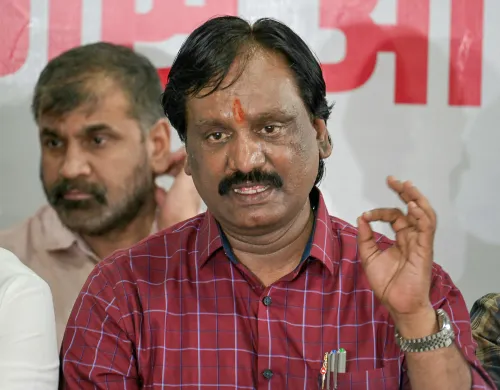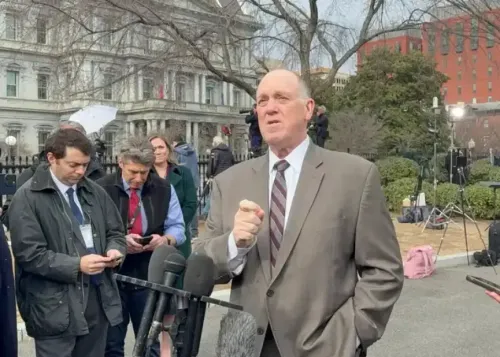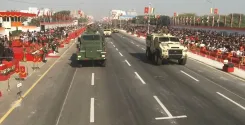What Challenges Did Pakistan Face in Disturbing India-Afghanistan Relations During Operation Sindoor?

Synopsis
Key Takeaways
- India and Afghanistan are reinforcing their historical ties.
- Pakistan's attempts to create distrust have been refuted.
- Recent dialogues emphasize a commitment to bilateral cooperation.
- Key areas of focus include humanitarian aid and trade.
- Regional dynamics are influencing India's approach to Afghanistan.
Kabul/New Delhi, May 16 (NationPress) India and Afghanistan are actively reshaping their longstanding friendship, even as Delhi's Khari Baoli, the largest dry fruit and spice market in Asia, feels the impact of the evolving geopolitical landscape and reduced imports from Kabul.
The recent call between External Affairs Minister (EAM) S. Jaishankar and Amir Khan Muttaqi, Afghanistan's Acting Foreign Minister, has conveyed a significant message: the Taliban regime, while not officially recognized by the Indian government, regards New Delhi as its most dependable ally in the region.
The positive dialogue between EAM Jaishankar and Muttaqi, which included a condemnation of the April 22 Pahalgam terrorist incident and a dismissal of efforts to sow discord with New Delhi, likely caused concern among Pakistan's political and military leadership.
“I appreciated his (Muttaqi) strong denial of recent attempts to undermine trust between India and Afghanistan through false narratives. I emphasized our historic friendship with the Afghan people and our ongoing commitment to their developmental needs,” EAM Jaishankar shared on X after the discussion.
Hafiz Zia Ahmad, Director of Public Communication at the Islamic Emirate of Afghanistan-Ministry of Foreign Affairs (IEA-MoFA), mentioned that the talks focused on enhancing bilateral ties, facilitating trade, and improving diplomatic relations.
“The Indian Foreign Minister emphasized the significance of the historical relations between Afghanistan and India, considering them pivotal for both nations' positive growth,” Ahmad told IANS, discussing topics such as visa facilitation for traders and patients, as well as the release of Afghan prisoners in India.
Just last week, Afghanistan dismissed Pakistan's claims of India conducting missile strikes on Afghan territory during Operation Sindoor as completely “baseless” and “unfounded”.
In a May 10 interview with Hurriyat Radio, a spokesperson for Afghanistan's Defence Ministry, Enaitullah Khawarzmi, categorically rejected Pakistan's assertions, labeling them as false.
This response from Kabul followed Indian Foreign Secretary Vikram Misri's dismissal of Pakistan's allegations as “ridiculous claims”.
Previously, Kabul had expressed serious worries regarding escalating tensions after the horrific Pahalgam attack that claimed 26 innocent lives.
Experts from Islamabad and Rawalpindi had speculated that the Taliban's takeover of Kabul in 2021 would mark the end of India's deep involvement with the Afghan people, which had reached unprecedented heights under Prime Minister Modi's administration, particularly in humanitarian and developmental assistance.
Less than four years later, the former Inter-Services Intelligence (ISI) chief, Lt Gen Faiz Hameed, is in military custody following court proceedings, while India maintains a strong position regarding Afghanistan.
“India's relationship with Afghanistan remains influenced by its long-standing ties, friendship with its populace, and relevant UN Resolutions like UNSCR 2593. After the Taliban's takeover, Indian personnel returned to India, but since June 2022, a team has been active in Kabul, focusing on humanitarian efforts,” EAM Jaishankar stated in a Lok Sabha session in December 2023.
“With historical and civilizational links to Afghanistan, our development partnership encompasses over 500 projects across all 34 provinces, addressing crucial areas such as power, water supply, infrastructure, healthcare, education, agriculture, and capacity enhancement,” he added.
The shift in dynamics was not instantaneous but resulted from extensive backroom diplomacy.
Ministry of External Affairs (MEA) Joint Secretary J P Singh, an adept diplomat with expertise in AfPak affairs, made visits to Kabul as the Taliban expressed interest in a robust relationship with New Delhi, aiming to avoid becoming a proxy for Pakistan again.
Earlier this year, Foreign Secretary Vikram Misri's meeting with Muttaqi in Dubai occurred shortly after India condemned Pakistan's December 24 airstrikes on Afghanistan, which resulted in numerous casualties, including women and children.
During this meeting, India committed to additional humanitarian aid, particularly for healthcare and the rehabilitation of Afghan refugees.
As per the MEA, the Foreign Secretary highlighted the robust people-to-people connections between the two nations and reaffirmed India's readiness to address the urgent developmental needs of the Afghan populace.
Given that India has provided multiple shipments of wheat, medicines, earthquake relief, and other essential supplies over recent years, the Afghan Minister expressed gratitude for India's ongoing support.
Both nations also agreed to enhance the utilization of the Chabahar port in Iran for trade and humanitarian assistance activities.
“The Afghan side acknowledged its sensitivities regarding India's security concerns. Both parties agreed to maintain open communication and regular interactions across various levels,” stated the MEA.
Experts believe that while India has sustained communication with the Taliban, the shifting regional strategic landscape — characterized by strained India-Pakistan relations and the Taliban's increasing ties with China — has expedited New Delhi's efforts to strengthen its connections with the Taliban.
“This is not solely a matter of trust; building mutual confidence will take time. However, the evolving regional dynamics and the Taliban's willingness to normalize ties with India are significant motivators for engagement. India is a vital market for Afghan products, and the Taliban understands that New Delhi can provide essential development aid. The Afghan populace is eager to see relations with India return to normal, especially in healthcare and education,” said Prof. Gulshan Sachdeva, Chief Coordinator at the Daskshin Global South Centre of Excellence at RIS New Delhi and Professor at Jawaharlal Nehru University (JNU).










